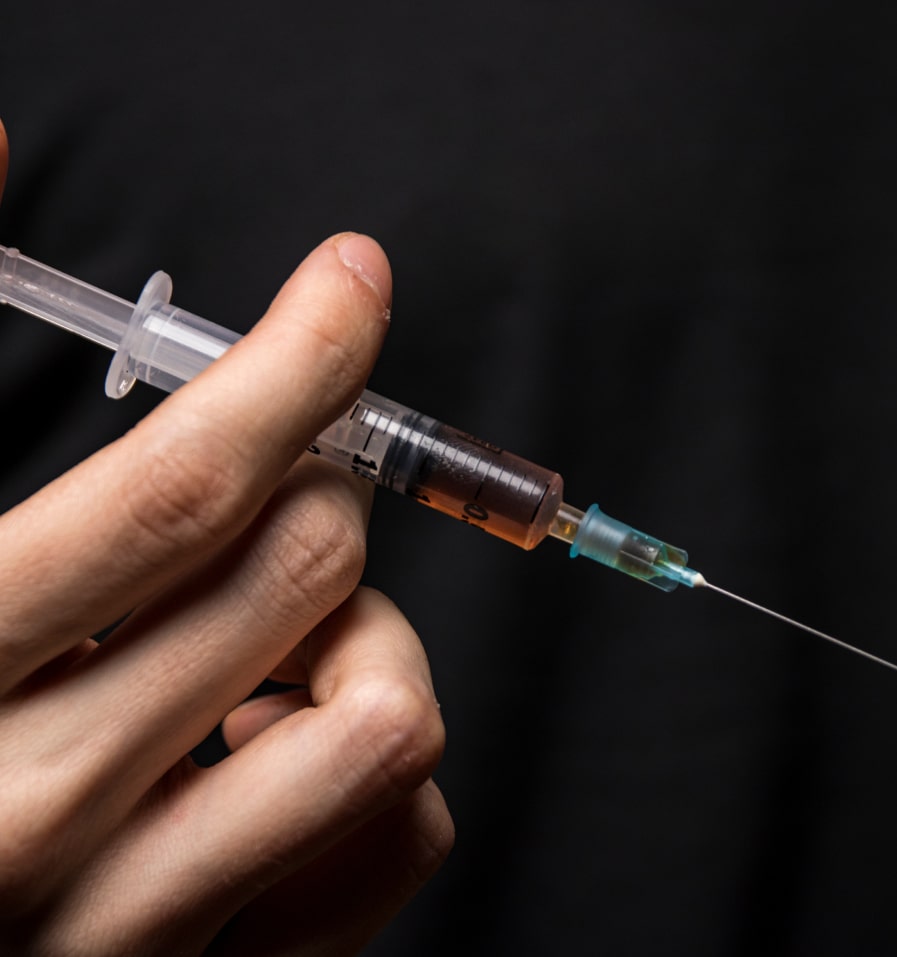Begin Your Journey
The help you need is just a step away. Contact us today to learn more about our treatment options.
Heroin is an opioid substance that interacts with opioid receptors in the central nervous system (CNS). Like many narcotic painkillers, heroin can induce a euphoric sensation that negatively impacts vital functioning like sleep, breathing, and heart rate.
With continued use, the CNS and the body can develop a tolerance to the substance, requiring one to take higher or more frequent doses to experience the same degree of euphoria. This can also lead to dangerous heroin dependence and the development of an Opioid Use Disorder (OUD).
Once heroin tolerance has developed, one may experience uncomfortable withdrawal symptoms if heroin use is suddenly discontinued. Heroin withdrawal symptoms are often associated with the following markers:[1]
As heroin plays a similar role in the body as a prescription painkiller, pain can seem elevated when heroin use stops as the substance is no longer masking physical pain in joints, the back, or elsewhere.
Each person’s experience with heroin use and withdrawal will be unique, as will their heroin withdrawal timeline. The duration of withdrawal symptoms could be influenced by when the last dose was taken, if there are any other substances on board, how much was taken at last use, and how dependent the body has become on heroin.
However, some common factors frequently ring true regarding heroin withdrawal symptoms. In most cases, symptoms set in within hours. How long these symptoms last can vary depending on patient health, metabolism, and more, but continue for a few days or several weeks.[2]
As the body begins eliminating harmful substances, there may be significant discomfort. This can, unfortunately, increase the risk of relapse as the desire is to alleviate the symptoms. In turn, this could also increase the risk of heroin overdose. It’s important to seek professional healthcare assistance to manage heroin withdrawal and combat cravings.
Heroin is a powerful opioid, and the body behaves similarly to this illegal street drug as it does with prescription opioids and opiates. Opioid withdrawal symptoms can be managed with both medical detox interventions and lifestyle self-care changes you can make at home.
Medication-assisted treatment (MAT) administered under medical supervision is usually part of inpatient detoxification or outpatient buprenorphine office therapy (OBOT). This form of meditation-based treatment helps reduce cravings and other opioid or heroin withdrawal symptoms without euphoria.[3] Other medications that may be administered include methadone and naltrexone.[4]
Lifestyle and self-care interventions for managing withdrawal symptoms include over-the-counter solutions for treating nausea, diarrhea, and pain, massage, yoga, and other activities you enjoy to improve well-being.
It’s important to note that the detox process can be uncomfortable and even painful. You are likely to experience more comfort and success under the care of medical professionals skilled in substance abuse treatment.
The 2021 National Survey on Drug Use and Health revealed that 0.4% (1.1 million people) aged 12 or older reported using heroin in the past year.[5] Additionally, 9,173 people died in heroin-specific deaths in 2021.[6] Heroin overdoses are most common in the 20 to 30 years age range, while other opioids are more common among those between 40 and 50 years. [7]
Amanda Stevens is a highly respected figure in the field of medical content writing, with a specific focus on eating disorders and addiction treatment. Amanda earned a Bachelor of Science degree in Social Work from Purdue University, graduating Magna Cum Laude, which serves as a strong educational foundation for her contributions.
Read moreThe help you need is just a step away. Contact us today to learn more about our treatment options.
Frequent or regular heroin use can result in significant negative outcomes, some of which are life-threatening. Heroin use is also associated with a deterioration of white matter in the brain, which can alter the natural stress response, the ability to make decisions and behavior regulation.[8]
Using heroin long-term can structurally and functionally change the communication chains in the brain and cause long-term damage or imbalance to hormonal and neuronal systems.[9] In some cases, these changes cannot be reversed.
Other medical complications of long-term heroin use include:[10]


While not typically life-threatening, heroin withdrawal can be extremely painful and uncomfortable and may present serious health risks without proper medical supervision. There is also the potential risk of relapse as well as overdose. When you put these concerns together, they paint a sobering picture.
Quitting heroin “cold turkey” isn’t recommended and may virtually ensure limited success. If you or a loved one are searching for answers and practical support for heroin use or other substance use disorders, help is available.
The first phase of treatment and recovery is residential detox. Here, you will have the freedom and support to focus on recovery under the expert care and supervision of substance abuse medical professionals.
After detox, inpatient addiction treatment programs offer both short-term and long-term treatment options to ensure the care you receive matches your needs. In this peaceful environment designed for recovery, you may receive behavioral therapy, medication-assisted treatment, nutrition guidance, counseling, adventure therapy, and more.
Outpatient programs, from partial hospitalization and intensive outpatient to standard outpatient and aftercare, are lower levels of care when you’ve built a degree of autonomy and independence in your recovery. You will participate in ongoing therapy, treatment, and support while beginning to explore more freedom in your schedule.
Wherever you are in your recovery journey, there’s a place for you and a customized treatment plan to meet your needs and facilitate your success. Freedom from substances and long-term recovery are the ultimate goals.
The symptoms you experience first may differ from what someone else may experience. Several factors influence the withdrawal experience, including metabolism, last dose amount, use frequency, and more. However, the first signs of withdrawal may include increased pain and drug cravings.
The average detox timeline for professional detox treatment is 3 to 10 days. However, each individual is assigned a customized treatment plan tailored to meet specific needs. Your treatment plan is curated based on substance abuse history, medical history, mental health needs, and more. In most cases, the full treatment process is 30 to 90 days,
There are several obvious indicators to identify a heroin overdose, including: [11]
These overdose symptoms all fall into three primary categories that make overdose identification simple: respiratory depression, reduced consciousness, and dilated or pinpoint pupils.
© 2025 SOBA New Jersey. All Rights Reserved.
SEO by DIGITECH
If you are ready to take the first step toward a new life free from substances, we are here to answer any questions and help you begin your recovery journey.
© All Rights Reserved 2025. Soba New Jersey. SEO by DIGITECH .
(888) 229-7989